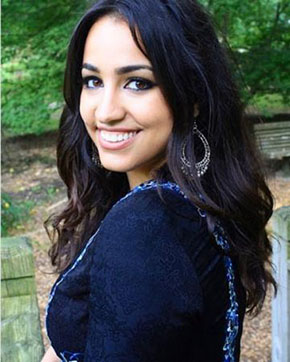Career goals can change at any time, and Assistant Professor Suja Sawafta is no stranger to transitioning from one ambitious career goal to another. A new faculty member in the Department of Modern Languages and Literatures, Sawafta recalls a time in college when she had a different trajectory in mind when deciding on a professional career path.
 “The initial plan was to attend law school and work for the United Nations. After receiving some advice that I was too passionate to work in law, I discovered a newfound fulfillment in education and teaching,” said Sawafta, who is a native Arabic speaker and the daughter of immigrants from Palestine. “My father is definitely one of my mentors. He is a former professor and a scientist, and a very influential person in my life. My mother is also a source of inspiration. She has taught me a great deal about empathy, love, and acts of service.”
“The initial plan was to attend law school and work for the United Nations. After receiving some advice that I was too passionate to work in law, I discovered a newfound fulfillment in education and teaching,” said Sawafta, who is a native Arabic speaker and the daughter of immigrants from Palestine. “My father is definitely one of my mentors. He is a former professor and a scientist, and a very influential person in my life. My mother is also a source of inspiration. She has taught me a great deal about empathy, love, and acts of service.”
Prior to joining the University of Miami, she taught Arabic Language and Literature at the University of Virginia and held a lecturer position teaching Arabic Studies at the University of North Carolina at Greensboro. She earned her Ph.D. (DPhil) at the University of Oxford in Modern Arabic Literature at the Faculty of Oriental Studies.
“Attending Oxford was an amazing experience,” said Sawafta. “There is this legacy in Oxford, which allows you to live in a type of fantasy when you are there, but then there’s also the side where it can get very serious, like dealing with deadlines and the heavy workload. I also learned that Oxford’s history as a colonial machine cannot be ignored, especially for me, being a person of color.”
During her time at Oxford, Sawafta concentrated her studies on 20th-century exilic writers who, by virtue of their political orientation or affiliation, were banished into exile. One such writer was Abdulrahman Munif, whose books discussed political oppression in the Middle East and were banned by Arab governments. Sawafta’s dissertation is entitled, “The Dialectic of the Sea and the Desert: Exile, Environment, and Politics in the novels of Abdulrahman Munif.”
“I became very interested in this concept of what it means to be a political dissident and an intellectual exile, as opposed to another type of migrant, for example, a refugee from Syria,” said Sawafta. “Why is there social capital afforded to exiles and how can it serve as a sort of fuel for intellectual commitment? How does the tie to the native land change by virtue of this experience? These are all questions that interest me.”
This fall semester, Sawafta is teaching two undergraduate courses in the College of Arts and Sciences—Writers and Rebels: The Female Renegades of Arabic Literature & Film and Intermediate Arabic. Sawafta says she is excited to teach students about female rebels in Arabic literature who dissent and challenge the patriarchal system. At the same time, she is also aware of the sensitivity surrounding conversations of racial inequity and prejudice that can spark complex discussions in the classroom.
“Liberating oneself through thought can happen in any classroom,” said Sawafta. “I hope to stand as an ally for students who are struggling, and to listen and learn through exchanges with students. In my courses, I try to illuminate the voices of people who are marginalized in their communities, and I always hope that organically this broader understanding can start conversations that can be applied to other struggles and conflicts both past and present.”

